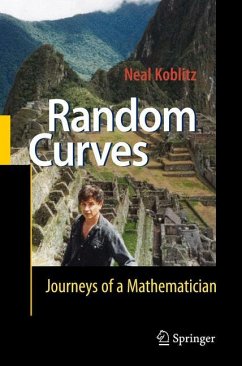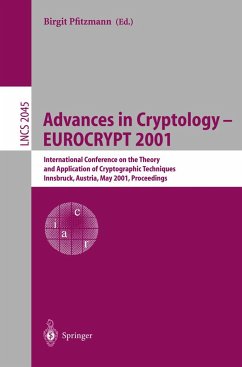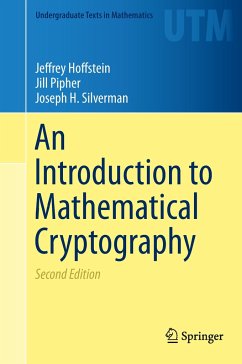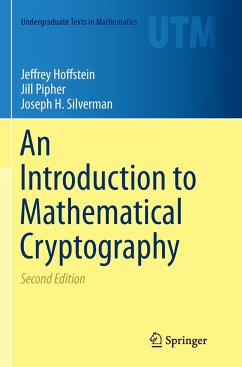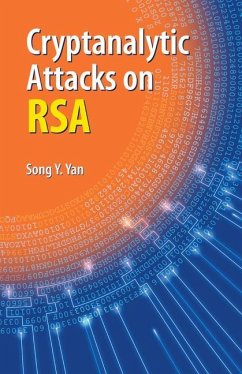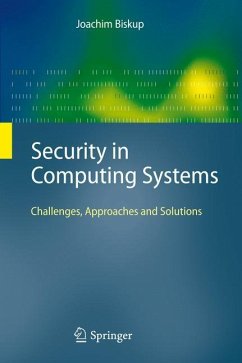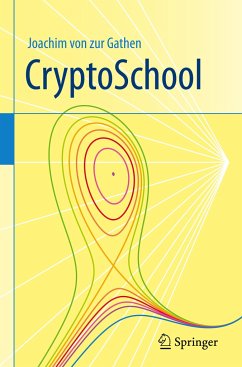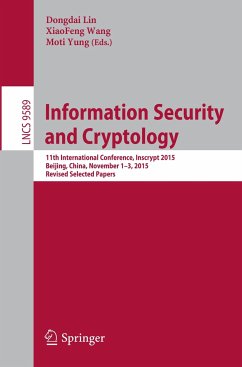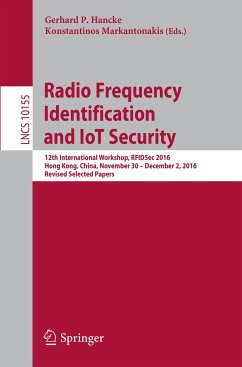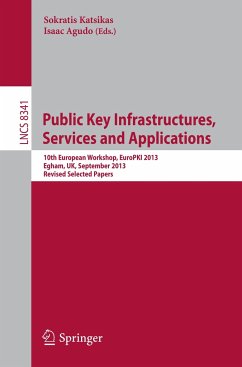Versandkostenfrei!
Versandfertig in 6-10 Tagen
Weitere Ausgaben:

PAYBACK Punkte
29 °P sammeln!





These autobiographical memoirs of Neal Koblitz, coinventor of one of the two most popular forms of encryption and digital signature, cover many topics besides his own personal career in mathematics and cryptography - travels to the Soviet Union, Latin America, Vietnam and elsewhere, political activism, and academic controversies relating to math education, the C. P. Snow two-culture problem, and mistreatment of women in academia.
The stories speak for themselves and reflect the experiences of a student and later a scientist caught up in the tumultuous events of his generation.
The stories speak for themselves and reflect the experiences of a student and later a scientist caught up in the tumultuous events of his generation.
Neal Koblitz is a Professor of Mathematics at the University of Washington in the Department of Mathematics. He is also an adjunct professor with the Centre for Applied Cryptographic Research at the University of Waterloo. He is the creator of hyperelliptic curve cryptography and the independent co-creator of elliptic curve cryptography. Professor Koblitz received his undergraduate degree from Harvard University, where he was a Putnam Fellow, in 1969. He received his Ph.D. from Princeton University in 1974 under the direction of Nickolas Katz.
Produktdetails
- Verlag: Springer / Springer Berlin Heidelberg / Springer, Berlin
- Artikelnr. des Verlages: 978-3-642-43015-2
- 2008
- Seitenzahl: 404
- Erscheinungstermin: 23. September 2014
- Englisch
- Abmessung: 235mm x 155mm x 22mm
- Gewicht: 617g
- ISBN-13: 9783642430152
- ISBN-10: 3642430155
- Artikelnr.: 42163084
Herstellerkennzeichnung
Springer-Verlag GmbH
Tiergartenstr. 17
69121 Heidelberg
ProductSafety@springernature.com
From the reviews:
"Random Curves: Journeys of a Mathematician has recently been published by Springer Verlag. ... focuses on Koblitz's life and his many journeys. ... serve as a travelogue as well as an autobiography, and give a different perspective on some of the countries than one might find elsewhere. ... Random Curves is a fun read and an interesting insight into the mind of a prolific and active mathematician." (Darren Glass, MathDL, March, 2008)
"Neal Koblitz is my kind of guy. How do I know? I've never met him, never even saw him on a platform at the AMS or MAA. But I've just read his memoir, Random Curves. He doesn't pull his punches. He knows right from wrong. He speaks truth to power! Koblitz attended Harvard
"Random Curves: Journeys of a Mathematician has recently been published by Springer Verlag. ... focuses on Koblitz's life and his many journeys. ... serve as a travelogue as well as an autobiography, and give a different perspective on some of the countries than one might find elsewhere. ... Random Curves is a fun read and an interesting insight into the mind of a prolific and active mathematician." (Darren Glass, MathDL, March, 2008)
"Neal Koblitz is my kind of guy. How do I know? I've never met him, never even saw him on a platform at the AMS or MAA. But I've just read his memoir, Random Curves. He doesn't pull his punches. He knows right from wrong. He speaks truth to power! Koblitz attended Harvard
Mehr anzeigen
College from 1965 to 1969. He majored in math and organized for the Progressive Labor Party, a Mao-ist oriented anti-war organization. In those days many people thought of Mao Tse-Tung as an ascetic poet-of-the-people type of revolutionary, uniting the best qualities of Vladimir Lenin, Charles DeGaulle and Mother Teresa. Nowadays, quite the opposite, one finds plentiful books and articles exposing Mao as a disgusting, hypocritical monster. But unlike the usual respectable academic with radical episodes in his youth, Koblitz never apologizes for his early politics. He just frankly tells what it was like. With relish. [...] But he has done much more than just teach number theory and publish papers. He has traveled and spent long periods living in those territories to which travel was largely forbidden or restricted in cold-war America, including the Soviet Union, Cuba, North Vietnam, Nicaragua and El Salvador. He tells about mathematical life and ordinary daily life in those terrae incognitae freshly and frankly. Moreover, back in Seattle he tried really hard to "serve the people" -- that is, to teach classes that meet the needs of ordinary undergraduates, and even ordinary little children in elementary school. Needless to say, his efforts to do good were rewarding and worthwhile, but he also met senseless and pointless frustrations and obstacles. [...] It has turned out that exotic number theory has a significant payoff in cryptography! Nowadays coding of confidential information often is based on the Rivest-ShamirAdleman method, which uses the simple fact that it is much easier to multiply two very large prime numbers together, than it is to factor the product back, to find those two prime factors. Long ago, Henri Poincaré discovered a sophisticated kind of "multiplication", which used elliptic curves to define a new kind of "product" of rational numbers. Neal Koblitz and Victor Miller both had the idea to use elliptic multiplication as a coding method. This method turns out to have significant practical advantages, and consequently Neal Koblitz was transformed into an applied mathematician, leading conferences on cryptography, and involved-no surprise!!-in sensational controversies with Eminent Authorities in the world of cryptography. The title "Random Curves" comes from this work in cryptography. He has written a fascinating chapter where he contrasts the two cultures-not the stale old literary and scientific "Two Cultures" of C.P. Snow, but rather the two cultures of academic pure mathematics and hard cash, big money cryptography." (Ruben Hersh, The College Mathematics Journal, 40:2, March 2009)
"Random Curves delivers a long and fascinating array of very sharp, personal and uncompromising comments on the great political events of the second half of the 20th century ... . Koblitz has made for this book ... carefully describing the math environment instead of the mathematics itself. ... Any mathematician or historian ... will find Random Curves absorbing. ... The book might also be attractive to young readers ... ." (Bernhelm Booss-Bavnbek, The Mathematical Intelligence, Vol. 31 (4), 2009)
"This is Neal Koblitz's autobiography. ... Neal Koblitz has lead an interesting life and he is an excellent writer. ... He has traveled a lot and has many opinions, mostly on academia, politics, and academic politics ... . There is a lot more and much of it is interesting. The book is very readable and has interesting things to say about academia, politics, and academic politics. ... I find this quite admirable." (William Gasarch, SIGACT News, Vol. 41 (3), September, 2010)
"Random Curves delivers a long and fascinating array of very sharp, personal and uncompromising comments on the great political events of the second half of the 20th century ... . Koblitz has made for this book ... carefully describing the math environment instead of the mathematics itself. ... Any mathematician or historian ... will find Random Curves absorbing. ... The book might also be attractive to young readers ... ." (Bernhelm Booss-Bavnbek, The Mathematical Intelligence, Vol. 31 (4), 2009)
"This is Neal Koblitz's autobiography. ... Neal Koblitz has lead an interesting life and he is an excellent writer. ... He has traveled a lot and has many opinions, mostly on academia, politics, and academic politics ... . There is a lot more and much of it is interesting. The book is very readable and has interesting things to say about academia, politics, and academic politics. ... I find this quite admirable." (William Gasarch, SIGACT News, Vol. 41 (3), September, 2010)
Schließen
Für dieses Produkt wurde noch keine Bewertung abgegeben. Wir würden uns sehr freuen, wenn du die erste Bewertung schreibst!
Eine Bewertung schreiben
Eine Bewertung schreiben
Andere Kunden interessierten sich für




